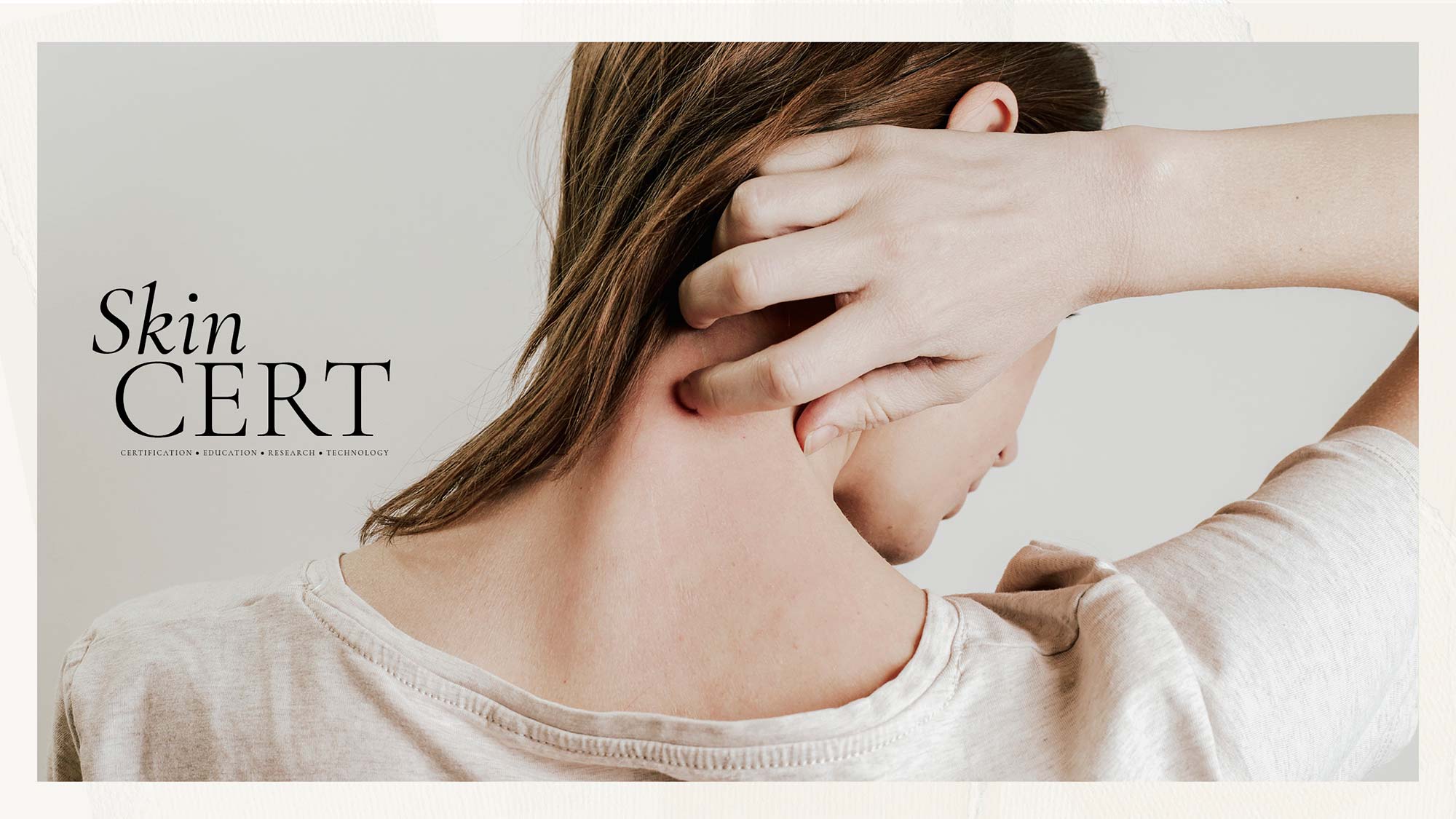Eczema treatment, causes and triggers: a sufferers guide to the condition
From one sufferer to another, consider this your need-to-know on the irritating skin condition, from what causes a flare-up to how it can be managed


From one sufferer to another, consider this your need-to-know on the irritating skin condition, from what causes a flare-up to how it can be managed
According to Allergy UK, as many as 15 million people are living with eczema in the UK alone. But despite its prevalence, a lot of us still aren't really sure of the best eczema treatment or what causes it.
Eczema varies from person to person – the best eczema creams that soothe one person's very unhappy skin may be completely different to what works for another. So to examine it thoroughly, we asked some of the country's top dermatologists, skin experts and those suffering from the condition to shed some light.
What is eczema?
'Also referred to as "dermatitis", eczema is a chronic inflammatory skin condition that can make your skin red, dry and itchy,' says Dr Walayat Hussain of Bupa Health Clinics. 'There are a number of different types of eczema, and the type you have determines which treatment options are best for you.'
Those with eczema have a genetic tendency to it. 'But that doesn't mean it will come out,' says Dr Amélie Seghers, Consultant Dermatologist at The Clinic by Dr Maryam Zamani and author of Eczema: How To Ditch The Itch (£11.86 | Amazon). 'You need to have the other factors in your life to be present at that point, to make it come out to make it flare.'
Eczema is not something that can be cured, but with the right creams and treatment plan, it can be controlled. 'I think that's important for lots of people to understand,' adds Dr Seghers. 'That doesn't mean that your quality of life will be affected. You can have a perfectly normal life in almost all cases, for almost all patients with eczema. Some patients really have very severe eczema, and that can be hard, but often that's because they're not properly treated.'
If you're experiencing uncomfortable hot and rashy skin that then becomes dry and itchy, there's a good chance that it's eczema, but your GP will be able to confirm a diagnosis. It can appear pretty much anywhere on the body; it's possible to get eczema on hands, feet, legs, arms, torso and eczema on the face.
Marie Claire Newsletter
Celebrity news, beauty, fashion advice, and fascinating features, delivered straight to your inbox!
Although eczema in babies is very common, many people will experience symptoms throughout adulthood too.
Is eczema contagious?
The biggest misconception about eczema is that it's contagious – but it absolutely is not. It's only if eczema becomes infected, and is open and weeping, that the infection itself may be contagious, Dr Hussain explains.
Treatment of eczema
There are many different options to manage eczema, and no 'one-size-fits-all' treatment plans. Your GP may prescribe topical steroid creams, such as hydrocortisone, which can stop inflammation.
Dr Seghers says that the key to controlling your eczema is the maintenance treatment, which is your everyday gentle skincare routine. Of course, there are treatment plans in place if you have a flare-up, but it's the day-to-day skincare that will keep your skin as strong as possible.
'Those who have a tendency to eczema lose water,' she says. 'Which means that the skin is dry. You also have a compromised skin barrier, which allows things like allergens, pollutants, irritants to get through, which further irritates it.' So making sure your skin is as moisturised and hydrated as possible, at all times, is absolutely key. 'Because then you actually make your skin barrier better, you make it stronger, and you will lose less water and put it in a better state.'
Dr Beibei Du-Harper, a dermatologist, says that it's also based on the individual. 'Treatment for eczema should be tailored based upon the severity of the condition, its impact on the patient and also what types of treatments they wish to use. For mild to moderate cases of eczema, regular use of a moisturiser is essential, and the addition of a prescription cream to treat flares is often helpful to manage things when creams alone don’t work. But in more severe cases, where the eczema is widespread or affects day-to-day life, there are medications that can be taken orally or injected that have been shown to reduce the over-active immunity and inflammation within the skin. These types of treatments can be life-changing for those who suffer from extremely severe eczema.'
Elise Loubatieres, a content creator who documents her eczema journey on social media is such a person. 'For many years I went through the cycle of treating my eczema with various topical steroids which would clear my rashes fairly quickly, but they would come back with a vengeance as soon as I stopped using them,' she says. 'I decided to stop using topical steroids in October 2020, as I was tired of this cycle and wanted a more long-term solution. Earlier this year my dermatologist had put me forward to start on biologics (power medication that slows or stops damaging inflammation), as I was really struggling with my skin and scalp, which was causing a lot of hair loss and we were worried that with the scarring my hair may not grow back. This medication doesn't come without its side effects though and taking it would require frequent monitoring and visits to the hospital. However, I was so desperate that I welcomed the idea that it could finally help me to lead a normal life again.'
She adds that this type of treatment plan is incredibly expensive and if you are pursuing this through the NHS, they will explore all other options first.
Knowing your triggers
Knowing what could cause your eczema flare-ups will be incredibly helpful in caring for your skin.
Triggers can be anything and they are different from person to person. 'It could be that having a vaccination causes your flare-ups,' says Dr Seghers. 'So before having one done you increase the amount of moisturising. It might not stop it completely, but it might give you a much milder reaction. I've known some patients flare up after an insect bite. It's itchy, so you give it a scratch and that will actually trigger an eczema flare.'
She says that it's common to flare up if you're unwell, for example, if you get a nasty bout of the flu because eczema sufferers tend to have an over-reactive immune system. So when you're sick, your eczema can flare. She recommends putting more moisturiser on when you start to feel poorly. 'It's about being prepared,' she says.
Other common triggers in children are teething and drooling, and in adults dust, frequent washing and friction.
One of the biggest triggers, which affects a lot of people, is stress. 'Stress is by far my biggest trigger,' says Loubatieres. 'I have such a physical response to it, which is usually uncontrollable itching until I cause damage to my skin, most of the time unconsciously.'
Are eczema and diet linked?
Many sufferers of medical skin conditions see a reduction in symptoms by carefully monitoring their diet, with dairy and acne being a prime example. So what's the deal with diet and eczema? 'Although changes in your diet can’t cure your eczema, in some cases it may help alleviate the symptoms and minimise flare-ups,' says Dr Hussain.
'Some cases of eczema are caused by an allergic reaction; the most common sources of allergic reactions from food are milk, eggs, peanuts, fish, soy, wheat, gluten and citrus, so you may find it helpful to try cutting back on some of those foods to see if it helps with your symptoms.
'Otherwise, a simple prick test can help identify exactly what you’re allergic to, so you can avoid those foods. It is however important that you discuss potential food allergies with your GP, dermatologist or allergy specialist to ensure you get the best advice which is relevant to you and best for your skin.'
Dr Seghers is keen to highlight though that trying to link eczema and diet is tricky. 'To find a new food allergy at the age of 30 is very unlikely, but what I do say is that when you have an inflammatory condition, you don't want to have an inflammatory diet, with lots of processed foods etc, as that is going to make matters worse. You put your body into an inflammatory state, which lowers the threshold for a flare. So in a way, I do think that diet plays a role, but I'm not sure whether one food type is making you flare by itself.'
She worries that too many people try to make the link in the hope that eczema will suddenly improve by cutting out certain foods. 'It's not that easy,' she says. 'This sometimes works for little babies and little children. For example, discovering an intolerance or allergy to dairy early on in childhood, you can take out the relevant things and see an improvement. But it's not that common for adults.'
Perioral dermatitis
If you have an eczema-like rash around your mouth, nose and eyes, it could actually be perioral dermatitis, which requires different treatment options. 'Periorificial dermatitis is a common facial skin problem characterised by groups of itchy or tender small red papules,' explains Dr Anjali Mahto, consultant dermatologist and author of The Skincare Bible.
'It is given this name because the papules occur around the eyes, the nostrils, the mouth and on occasions, the genitals. The more restrictive term, perioral dermatitis, is often used when the eruption is confined to the skin in the lower half of the face, particularly around the mouth. Periocular dermatitis may be used to describe the rash affecting the eyelids.'
Your doctor or dermatologist will be able to confirm a diagnosis, so it's important you arrange an appointment to confirm.
What causes perioral dermatitis?
'The exact cause of periorificial dermatitis is not totally understood but research has shown it may be related to epidermal barrier dysfunction, activation of the innate immune system, altered cutaneous microflora or follicular fusiform bacteria,' says Dr Anjali.
Treatment
The good news here: 'Although it may take several weeks before there is a noticeable improvement, periorificial dermatitis does respond well to treatment,' explains Dr Mahto. 'The best way to treat periorificial dermatitis is to stop using all face creams including topical steroids, cosmetics and sunscreens.
'Also, do consider a slower withdrawal from topical/steroid/face creams if there is a severe flare after steroid cessation. I would recommend replacing it with a less potent or less occlusive cream or applying it less frequently until it is no longer required. If the rash is present, wash your face only with warm water alone. Only use a non-soap or liquid cleanser when the rash is cleared up.'
Katie Thomas is the Senior Beauty Editor at Marie Claire UK. With over 10 years of experience on women's luxury lifestyle titles, she covers everything from the best beauty looks from the red carpet and stand out trends from the catwalk, to colonic irrigation and to the best mascaras on the market. She started her career on fashion desks across the industry - from The Telegraph to Brides - but found her calling in the Tatler beauty department. From there she moved to Instyle, before joining the Marie Claire digital team in 2018. She’s made it her own personal mission to find the best concealer in the world to cover her tenacious dark circles. She’s obsessed with skincare that makes her skin bouncy and glowy, low-maintenance hair that doesn’t require brushing and a cracking good manicure. Oh and she wears more jewellery than the Queen.
-
 Here's a rundown of The White Lotus cast members who have dated in real life
Here's a rundown of The White Lotus cast members who have dated in real lifeBy Jenny Proudfoot
-
 All the coolest brides are wearing drop-waist wedding dresses this year
All the coolest brides are wearing drop-waist wedding dresses this yearWedding Special Minimalist, nostalgic, and universally flattering
By Clementina Jackson
-
 Anya Hindmarch has just launched a fantastical diving shop in central London
Anya Hindmarch has just launched a fantastical diving shop in central LondonFor those who would rather be beside the seaside...
By Sofia Piza